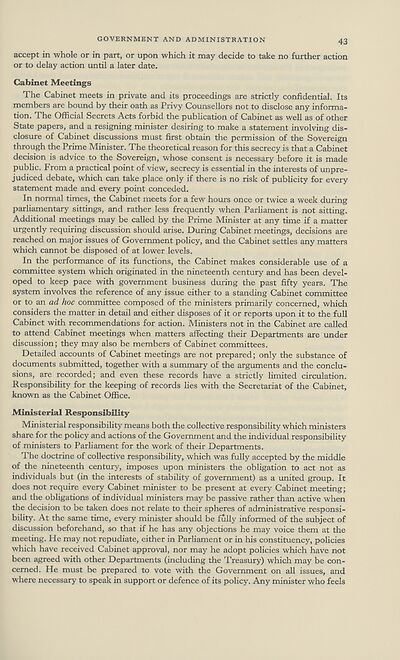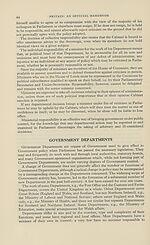Download files
Complete book:
Individual page:
Thumbnail gallery: Grid view | List view

GOVERNMENT AND ADMINISTRATION
43
accept in whole or in part, or upon which it may decide to take no further action
or to delay action until a later date.
Cabinet Meetings
The Cabinet meets in private and its proceedings are strictly confidential. Its
members are bound by their oath as Privy Counsellors not to disclose any informa¬
tion. The Official Secrets Acts forbid the publication of Cabinet as well as of other
State papers, and a resigning minister desiring to make a statement involving dis¬
closure of Cabinet discussions must first obtain the permission of the Sovereign
through the Prime Minister. The theoretical reason for this secrecy is that a Cabinet
decision is advice to the Sovereign, whose consent is necessary before it is made
public. From a practical point of view, secrecy is essential in the interests of unpre¬
judiced debate, which can take place only if there is no risk of publicity for every
statement made and every point conceded.
In normal times, the Cabinet meets for a few hours once or twice a week during
parliamentary sittings, and rather less frequently when Parliament is not sitting.
Additional meetings may be called by the Prime Minister at any time if a matter
urgently requiring discussion should arise. During Cabinet meetings, decisions are
reached on major issues of Government policy, and the Cabinet settles any matters
which cannot be disposed of at lower levels.
In the performance of its functions, the Cabinet makes considerable use of a
committee system which originated in the nineteenth century and has been devel¬
oped to keep pace with government business during the past fifty years. The
system involves the reference of any issue either to a standing Cabinet committee
or to an ad hoc committee composed of the ministers primarily concerned, which
considers the matter in detail and either disposes of it or reports upon it to the full
Cabinet with recommendations for action. Ministers not in the Cabinet are called
to attend Cabinet meetings when matters affecting their Departments are under
discussion; they may also be members of Cabinet committees.
Detailed accounts of Cabinet meetings are not prepared; only the substance of
documents submitted, together with a summary of the arguments and the conclu¬
sions, are recorded; and even these records have a strictly limited circulation.
Responsibility for the keeping of records lies with the Secretariat of the Cabinet,
known as the Cabinet Office.
Ministerial Responsibility
Ministerial responsibility means both the collective responsibility which ministers
share for the policy and actions of the Government and the individual responsibility
of ministers to Parliament for the work of their Departments.
The doctrine of collective responsibility, which was fully accepted by the middle
of the nineteenth century, imposes upon ministers the obligation to act not as
individuals but (in the interests of stability of government) as a united group. It
does not require every Cabinet minister to be present at every Cabinet meeting;
and the obligations of individual ministers may be passive rather than active when
the decision to be taken does not relate to their spheres of administrative responsi¬
bility. At the same time, every minister should be fully informed of the subject of
discussion beforehand, so that if he has any objections he may voice them at the
meeting. He may not repudiate, either in Parliament or in his constituency, policies
which have received Cabinet approval, nor may he adopt policies which have not
been agreed with other Departments (including the Treasury) which may be con¬
cerned. He must be prepared to vote with the Government on all issues, and
where necessary to speak in support or defence of its policy. Any minister who feels
43
accept in whole or in part, or upon which it may decide to take no further action
or to delay action until a later date.
Cabinet Meetings
The Cabinet meets in private and its proceedings are strictly confidential. Its
members are bound by their oath as Privy Counsellors not to disclose any informa¬
tion. The Official Secrets Acts forbid the publication of Cabinet as well as of other
State papers, and a resigning minister desiring to make a statement involving dis¬
closure of Cabinet discussions must first obtain the permission of the Sovereign
through the Prime Minister. The theoretical reason for this secrecy is that a Cabinet
decision is advice to the Sovereign, whose consent is necessary before it is made
public. From a practical point of view, secrecy is essential in the interests of unpre¬
judiced debate, which can take place only if there is no risk of publicity for every
statement made and every point conceded.
In normal times, the Cabinet meets for a few hours once or twice a week during
parliamentary sittings, and rather less frequently when Parliament is not sitting.
Additional meetings may be called by the Prime Minister at any time if a matter
urgently requiring discussion should arise. During Cabinet meetings, decisions are
reached on major issues of Government policy, and the Cabinet settles any matters
which cannot be disposed of at lower levels.
In the performance of its functions, the Cabinet makes considerable use of a
committee system which originated in the nineteenth century and has been devel¬
oped to keep pace with government business during the past fifty years. The
system involves the reference of any issue either to a standing Cabinet committee
or to an ad hoc committee composed of the ministers primarily concerned, which
considers the matter in detail and either disposes of it or reports upon it to the full
Cabinet with recommendations for action. Ministers not in the Cabinet are called
to attend Cabinet meetings when matters affecting their Departments are under
discussion; they may also be members of Cabinet committees.
Detailed accounts of Cabinet meetings are not prepared; only the substance of
documents submitted, together with a summary of the arguments and the conclu¬
sions, are recorded; and even these records have a strictly limited circulation.
Responsibility for the keeping of records lies with the Secretariat of the Cabinet,
known as the Cabinet Office.
Ministerial Responsibility
Ministerial responsibility means both the collective responsibility which ministers
share for the policy and actions of the Government and the individual responsibility
of ministers to Parliament for the work of their Departments.
The doctrine of collective responsibility, which was fully accepted by the middle
of the nineteenth century, imposes upon ministers the obligation to act not as
individuals but (in the interests of stability of government) as a united group. It
does not require every Cabinet minister to be present at every Cabinet meeting;
and the obligations of individual ministers may be passive rather than active when
the decision to be taken does not relate to their spheres of administrative responsi¬
bility. At the same time, every minister should be fully informed of the subject of
discussion beforehand, so that if he has any objections he may voice them at the
meeting. He may not repudiate, either in Parliament or in his constituency, policies
which have received Cabinet approval, nor may he adopt policies which have not
been agreed with other Departments (including the Treasury) which may be con¬
cerned. He must be prepared to vote with the Government on all issues, and
where necessary to speak in support or defence of its policy. Any minister who feels
Set display mode to:
![]() Universal Viewer |
Universal Viewer | ![]() Mirador |
Large image | Transcription
Mirador |
Large image | Transcription
The item on this page appears courtesy of Office for National Statistics and may be re-used under the Open Government Licence for Public Sector Information.
| Britain and UK handbooks > Britain: An official handbook > 1959 > (63) |
|---|
| Permanent URL | https://digital.nls.uk/204571382 |
|---|
| Attribution and copyright: |
|
|---|---|
| Description | 'Britain: An official handbook' was produced annually by the Central Office of Information from 1954-1998. There are 44 volumes available here to view. |
|---|---|
| Shelfmark | GII.11 |
| Description | Three titles produced by the British Government from 1954-2005 describing 'how Britain worked'. They are: 'Britain: An official handbook' (1954-1998), 'Britain: The official yearbook of the United Kingdom' (1999-2001), and 'UK: The official yearbook of the United Kingdom of Great Britain and Northern Ireland' (2002-2005). These 50 reports provide an overview of Britain's economic, social and cultural affairs, its environment, international relations, and the systems of government. They give an impartial summary of government policies and initiatives, and explain how public services are organised. |
|---|---|
| Additional NLS resources: |
|

